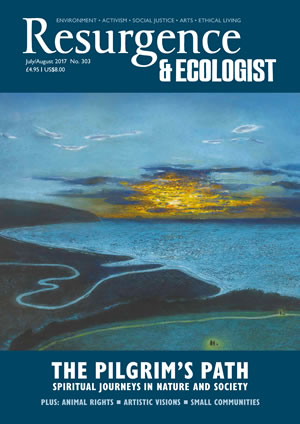The Great Climate Robbery is a devastating and well-documented account of how the food industry is both driving climate change and damaging the chances of the world feeding itself as the human population continues to grow.
Although it is a call to action to defend small farmers, who still produce most of the world’s food, a large part of the book is a detailed account of the unrelenting and largely successful campaign by big companies to take over the world’s food supply and exploit it for profit.
The authors pull no punches and name the villains. This account submits the farming industry to the kind of scrutiny that the oil companies have received to expose their repeated efforts to undermine action to combat climate change.
Chapter headings like ‘The Exxons of Agriculture’ describe the successful efforts that big fertiliser companies have made to become involved in climate talks and prevent actions that might damage their business.
The result of the march of industrial agriculture is that the whole food chain is now a heavy emitter of greenhouse gases. According to this book, the rise of palm oil plantations for processed food, and the overuse of fertilisers, together with the many miles produce travels to get to our plates, produce about 50% of all human greenhouse gas emissions. This is a bold claim, but it is not without a remarkable body of evidence. Every chapter has a long list of footnotes citing scientific papers and UN reports.
Although the industrial methods on the farm only produce between 11% and 15% of emissions, the book examines the whole food business, starting with deforestation to convert to farmland, and continuing with transport, food-processing factories, the freezing and retail industries, and discarded food waste.
The solution to the problem, the authors say, is to wrest control from big companies and hand it back to local farmers. Here again the statistics are telling. Over the past fifty years, 140 million hectares – an area the equivalent of almost all the farms in India – has been taken over by four crops grown predominantly on large industrial plantations: soybean, palm oil, rapeseed and sugar cane.
Small farms, meanwhile, have been squeezed into less than a quarter of the world’s agricultural land, but they continue to produce most of the world’s food. According to the UN’s Food and Agriculture Organization, they produce 80% of food in non-industrialised countries. The great advantage of small farms, apart from producing more food from a smaller area, is that they supply local markets with fresh rather than processed products, and less is wasted.
GRAIN, the organisation that produced this book, describes itself as “a small international non-profit organisation that works to support small farmers and social movements in their struggles for community-controlled and biodiversity-based food systems”. Its role is to try to save the farmers of Africa and Asia from land grabs by corporations and governments. This is not just for the sake of the farmers who lose their homes and livelihoods as a result, but for the benefit of the whole planet. The message, supported by copious evidence, is that small farms are far more productive than industrial agriculture, and that if we lose this output the world will go hungry.
It is a convincing argument and a very disturbing one, not least because the United Nations Climate Agreements on agriculture appear to have been hijacked by the farming industry to allowed the continued use of vast quantities of fertiliser and industrial methods that ruin the quality of the soil.
Even traditions like saving seeds for the next year’s crop, which preserves varieties suitable for local conditions, are under attack from multinationals who want to control all seed production. The book predicts that without the expert input and productive capacity of small farmers food shortages will cause serious unrest.
One disturbing thought not mentioned by GRAIN: Europe and America have almost entirely lost small farmers and their expertise already. Our most productive land has largely been taken over by the monoculture of big agriculture that has already destroyed much of the diversity of the surrounding environment. How will we feed ourselves when there is no surplus food to import? Sobering stuff.






